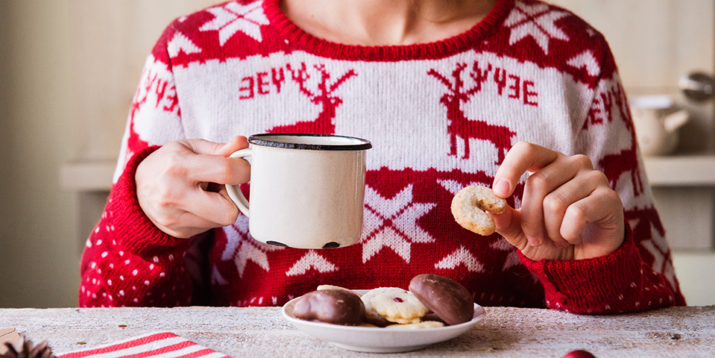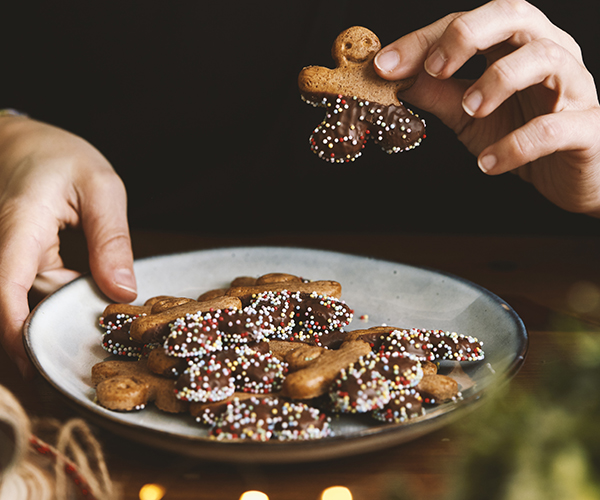9 Tips to Avoid Binging on Food During the Holidays

Nothing kills the holiday spirit like guilt and shame. This season, when things are anything but normal, focus on the positive and forming new habits.
Let go of those negative feelings and regain control of your eating habits, with tips for not binging on food during the holidays.
(And find out how to move on if you do binge.)
First up, know that binging isn’t the same as feeling like you ate too much (your stomach is full) or thinking you ate too much (you consumed more than you planned), explains Dr. Rachel Evans, a psychologist who specializes in eating disorder recovery.
Binging is consuming, within a specific timeframe, “an amount of food that is definitely larger than most people would eat in a similar period of time under similar circumstances,” says Evans.
Another hallmark of binging is feeling like you lack control and that you’re unable to stop. While that can feel isolating and hopeless, you’re not alone.
Here are nine tips for avoiding a food binge over the holidays.
1. Connect with a therapist and/or dietitian
If you’re binging regularly, consider talking to a professional. A dietitian can “help you to evaluate why cravings, appetite, and eating issues are occurring,” explains Heidi Moretti, M.S., R.D.
Alternatively, consider talking to a therapist. They can help you not only prepare emotionally for big holiday meals ahead but also, as Evans explains, “reclaim the time, the brain space, and emotional energy that binge eating is taking from you.”
If you’re locked down or in quarantine, consider a text-based or video therapy service.
2. Take guilt off the table
Remind yourself ‘that everyone can and should have celebrations surrounding foods,” suggests Moretti. “Guilt is a set-up for restricting and then subsequent overeating.”
A therapist can help you unpack this guilt and strip it away from festive indulgences, especially if you start working with them in anticipation of these events.
3. Don’t let yourself get overly hungry
Don’t skip breakfast, lunch, or snacks to “save” calories for later, warns Evans. Instead, start your day with a healthy breakfast and a workout, just as you would on any other day.
Skipping meals can cause you to get too hungry, which can cause you to eat too fast.
It’s much easier to miss signs that you’re getting full this way and eat more than you planned. “Overeating because of physical hunger can trigger feelings of guilt or eating even more,” Evans explains.

4. Remember these meals aren’t your everyday meals
“A few days of indulgence or extra food isn’t going to derail your progress in the longer term,” Evans underscores.
Remind yourself that the holidays are a special time. In some cases, it’s the only time of the year you get to eat certain foods!
And remind yourself that, because the festivities do last longer than one meal, you can take it slow and try one treat a day, for example.
And if you prefer, make a healthier treat to enjoy and share.
Our pick? These no-bake Peppermint Mocha Shakeology Cake Pops.
5. Eat more mindfully
When you’re eating more indulgent foods, “savor every bite slowly and feel good while doing it,” says Moretti.
Evans adds that you’re also more aware of feeling full when you eat mindfully, which can help prevent binging.
So turn off the TV and put away your phone. Set down your fork between bites, and soak up the ambiance and companionship, even if it’s via Zoom this year.
6. Be kind to yourself
For some of us, kind inner dialogue doesn’t come natural. That’s something a therapist can help you cultivate, and it’s worth the work.
A kind inner voice allows you to have a second slice of pecan pie, stripping away the guilt that might make you feel like you blew it so you might as well binge.
Reminder: If you wouldn’t say something out loud to a friend, you shouldn’t say it to yourself.

7. Skip (or limit) the alcohol
Pass up alcohol “because it can trigger overeating,” Moretti suggests. Although studies on the subject are small and more research is called for, one study found that certain amounts of alcohol increased appetite because participants felt hungrier after drinking.
Alcohol can also lower your inhibitions (while adding empty calories), so you might be less able to resist a food binge.
8. Check in with your feelings
If you’re worried about binging at a specific event, Evans advises that you dig into why that is beforehand.
If stress is causing the urge to binge, getting to the root issue will help you identify productive actions you can take, since “food isn’t really going to help with the stress.”
9. Redirect your attention
The holidays are known for special foods, but they also offer rare opportunities that may distract you from food binge urges.
If you’re near your family, focus on spending time with them (if you can do so safely).
Try something new with the extra free time you have or twist a tradition away from food. Evans suggests making cards instead of cookies.
Or try these 12 easy Christmas crafts to ease stress during the holiday season.
